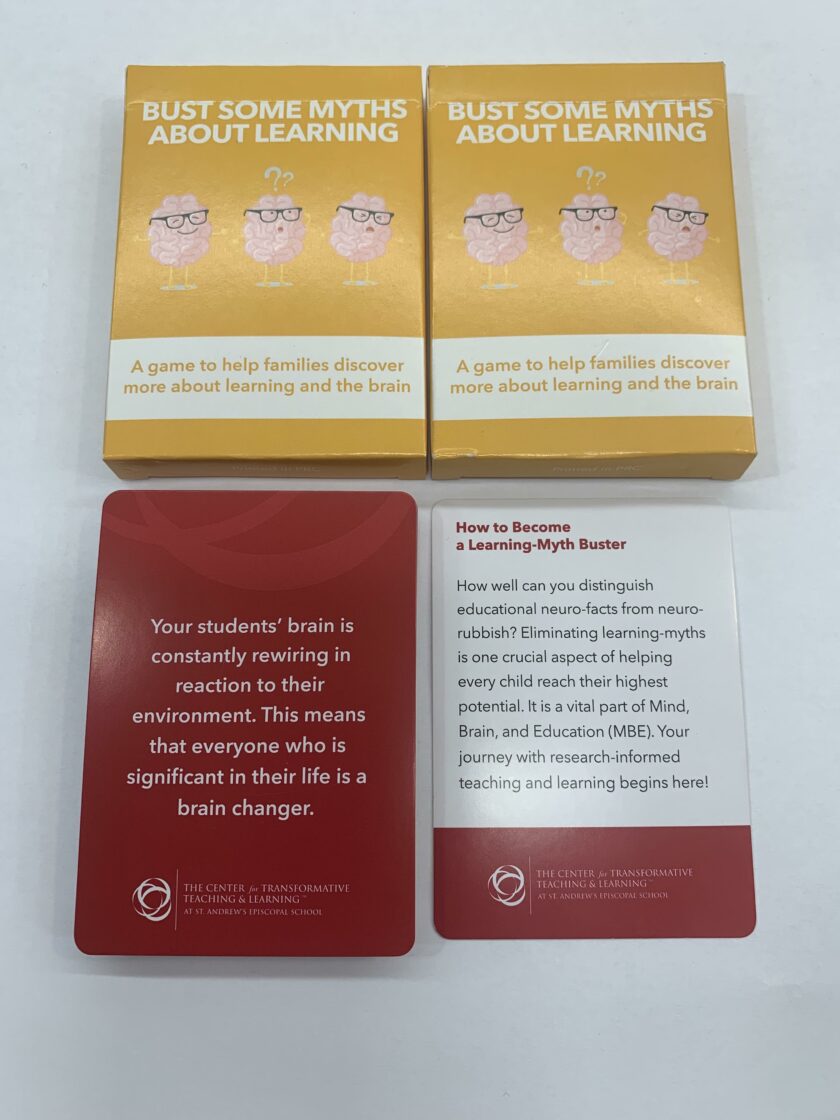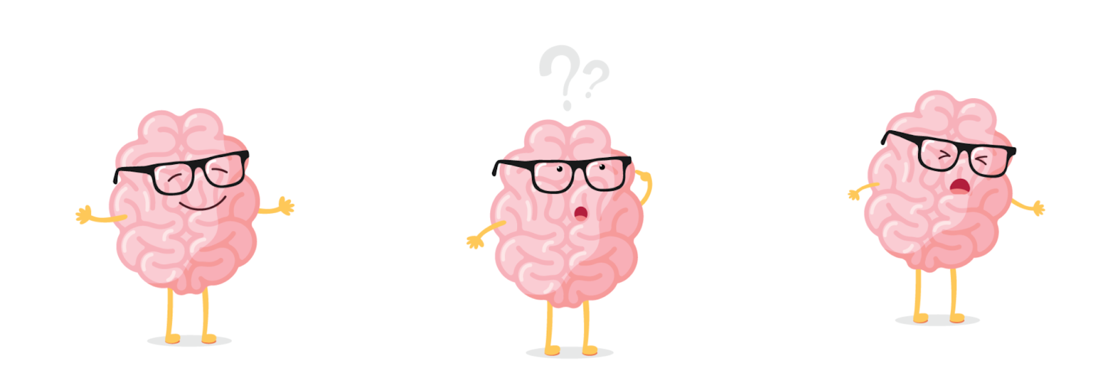A game to help families discover more about learning and the brain

How well can you distinguish educational neuro-facts from neuro-rubbish? Eliminating learning-myths is one crucial aspect of helping every child reach their highest potential. It is a vital part of Mind, Brain, and Education (MBE). Your journey with research-informed teaching and learning begins here!
Instructions
Read the red side of each card, decide if the statement is true or false, then flip over to find out.
Rewiring your brain to eliminate learning myths and neurorubish may take more than one game with these cards. So build in some spaced practice—put these cards in a place where you will come across them in one week’s time, and set a reminder on your phone right now to play the game again.
Warning, we wrote these cards to provoke discussion! Many challenge commonly held beliefs and statements out there in media. But all are supported by research.

Share with us
We love to spread the word of being an evidence-informed supporter of your child’s education. So, if you are willing, please take a picture of you or your family playing with these cards and share it with us via Twitter (tag us @theCTTL) along with a sentence about what you learned, or email it to us: info@thecttl.org. We love to hear your stories!
If you have any suggestions for a new card to add to our deck, a learning myth you would love to see busted, or have thoughts of a new game to play with our cards, please send us an email.
References
Each card is supported by multiple pieces of research. The list below gives one citation for each card as a starting point for exploring more.
- Wai, J., Lubinski, D., & Benbow, C. P. (2009). Spatial Ability for STEM Domains: Aligning Over 50 Years of Cumulative Psychological Knowledge Solidifies Its Importance. Journal of Educational Psychology, 101(4), 817–835.
- Cowan, N. (2008). Chapter 20, What are the differences between long-term, short-term, and working memory? In Progress in Brain Research (Vol. 169, pp. 323–338). Elsevier.
- Bruyckere, P. D., Kirschner, P. A., & Hulshof, C. D. (2015). Urban Myths about Learning and Education. Academic Press.
- Maloney, E. A., Ramirez, G., Gunderson, E. A., Levine, S. C., & Beilock, S. L. (2015). Intergenerational Effects of Parents’ Math Anxiety on Children’s Math Achievement and Anxiety. Psychological Science, 26(9), 1480–1488.
- Dekker, S., Lee, N. C., Howard-Jones, P., & Jolles, J. (2012). Neuromyths in Education: Prevalence and Predictors of Misconceptions among Teachers. Frontiers in Psychology, 3.
- (Cards 5, 21, & 22) Macdonald, K., Germine, L., Anderson, A., Christodoulou, J., & McGrath, L. M. (2017). Dispelling the Myth: Training in Education or Neuroscience Decreases but Does Not Eliminate Beliefs in Neuromyths.
Frontiers in Psychology, 8.
(Cards 9 & 26) Dunlosky, J., Rawson, K. A., Marsh, E. J., Nathan, M. J., & Willingham, D. T. (2013). Improving Students’ Learning With Effective Learning Techniques: Promising Directions From Cognitive and Educational Psychology. Psychological Science in the Public Interest, 14(1), 4–58. - Kirschner, P. A., & De Bruyckere, P. (2017). The myths of the digital native and the multitasker. Teaching and Teacher Education, 67, 135–142.
- Hinton, C., Fischer, K., & Glennon, C. (2012). Mind, Brain, and Education: The Student at the Center Series. Mind, Brain, and Education, March, 2012.
- Dweck, C. S. (2007), The Perils and Promises of Praise. ASCD Educational Leadership, 65, 34–39
- Karpicke, J. D. (2016). A powerful way to improve learning and memory. Psychological Science Agenda.
- Executive Function & Self-Regulation. Center on the Developing Child at Harvard University.
- Agarwal, P. K., & Bain, P. M. (2019). Powerful Teaching: Unleash the Science of Learning. Jossey-Bass.
- Deans for Impact (2019). The Science of Early Learning. Austin, TX: Deans for Impact.
- Bruyckere, P. D. (2019). More Urban Myths About Learning and Education: Challenging Eduquacks, Extraordinary Claims, and Alternative Facts. Routledge.
- Dehaene, S. et al. (2010). How Learning to Read Changes the Cortical Networks for Vision and Language. Science, 330(6009), 1359–1364
A deeper dive into learning styles research:
A review of research by leading expert Professor Dan Willingham:
Professor Dan Willingham: Learning Styles Don’t Exist
More about the “learning styles” cards
We wrote these cards to provoke—and we know that some may distress, annoy, or frustrate you more than others. The two cards on the infamous “learning styles” myth, in particular, might be troublesome. Here are some details about that myth.
Teachers should not try to teach to the perceived learning styles of their students. There has been much research on this, and no study had found there to be a benefit from doing so—and there is evidence that it might hurt some students. Howard Gardner’s original work on multiple intelligences, which the origin of this myth is rooted in, did not propose this idea. There is no supporting evidence. But the myth just seemed to gather its own momentum and became a widespread belief. Howard Gardner himself is upset that his work has been warped this way, and wishes that people would refrain from propagating this myth. Instead, teachers should use a variety of modalities, letting their knowledge of the content determine which means would work best for the content they are teaching.
